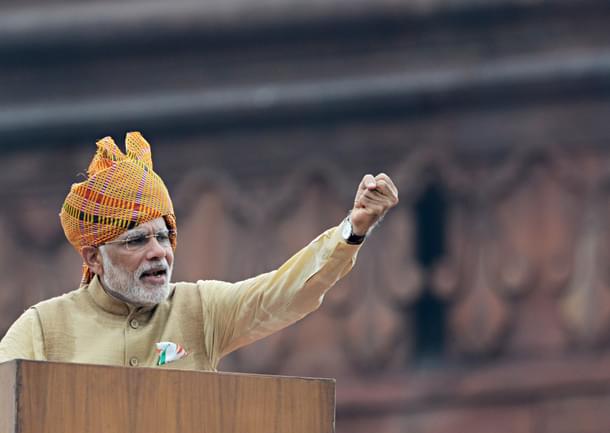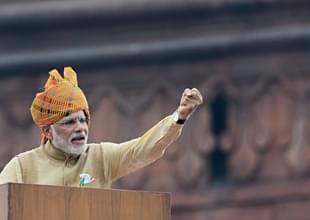Economy
How Modi’s Fight Against Cronyism and Corruption May Be Costing Him Growth
R Jagannathan
Feb 27, 2016, 12:24 PM | Updated 12:24 PM IST
Save & read from anywhere!
Bookmark stories for easy access on any device or the Swarajya app.


- Promoters are now forced to put their own money in projects instead of large tax-evaded piles of cash.
- No more bankrolling of promoter’s own projects by banks and financial institutions.
- Huge successes of the spectrum and coal auctions has left little money in the hands of promoters to invest in the business.
- Thanks to the draconian black money bill, future disclosures will attract a 90 percent tax, which dissuades the use of illegal hoards for productive investment.
- Due to the closure of other avenues for rent-seeking and cronyism, money is not flowing into the real estate which saw outrageous levels of growth in the past.
Chief Economic Advisor Arvind
Subramanian’s Economic Survey of 2015-16, presented to parliament yesterday (26
February), has been widely appreciated for its sharp analytical focus and sober
forecasts for the future, with growth in 2016-17 predicted in the range of
7-7.75 percent, well below the economy’s potential of 8-10 percent.
The survey rightly lists weak global growth prospects, the need for continued fiscal consolidation, a rising portfolio of banks’ bad loans, two consecutive weak monsoons, and rural distress as important factors for slower-than-expected growth this year – factors which may continue in 2016-17.
However, there is inadequate stress on another underlying factor that too could depress growth in the medium term – possibly for another two years. These relate to two important achievements so far of the new government headed by Narendra Modi: the perceived reduction in corruption at the highest levels, which makes cronyism more difficult, and the reduction in rent-seeking opportunities that result from such cronyism. However, desirable from an ethical standpoint and future economic efficiency, they are short-term downers.
One can expect long-term benefits for the economy from a steady reduction in corruption and cronyism, but the short-terms impact can often reduce opportunities for corporate revival.
Consider what happens when corruption and black money are endemic.
First, much larger tax-evaded money is available with promoters and businessmen to invest both in influencing policies and in providing their share of capital to businesses. Now that this avenue is closing, it means that promoters have to dig deeper into their own pockets to invest in their flagship companies. When you have to put your own cash for investment, you will be less reckless and more circumspect in where you invest. This cannot but be a major factor in delaying a broad investment revival.
Second, most Indian businesses have, in the past, funded their own equity investments by inflating project costs, capturing the margins elsewhere, and then bringing these clandestine funds as their contribution to equity. In other words, banks and financial institutions effectively bankrolled even promoters’ own investments in projects. This worked fine when there was a licence-permit raj, since licences were effectively licences to print money. But in an era of free competition, this is no longer possible. Risks escalate with the rise of market-driven economics. Even cronyism is no guarantee of profits.
Third, with the gradual shift of all sales of scarce resources to auctions, opportunities for rent-seeking have reduced dramatically. The huge successes of the spectrum and coal auctions, while good for state exchequers, also leave little money in the hands of promoters to invest in the business. Logically, they should raise capital from the markets by diluting their own stakes, but so far no Indian businessman has voluntarily embraced the idea of being reduced to a minority stakeholder and allowed professional managers to call the shots. Little wonder, with banks no longer willing to bankroll their private equity contributions, their own investment risk appetite is reduced, since it bring the possibility of loss of corporate control. When staking their billions, paper billionaires are more risk averse than middle class salaried people.
Fourth, the draconian Black Money Bill introduced by Arun Jaitley in the last budget session, which resulted in paltry collections from voluntary disclosures of foreign assets and incomes, has closed another route for domestic investment based on illegal assets held abroad. While this is morally correct, it is not pragmatic. If we assume that many big businessmen have hoards of illegal wealth abroad, this money could usefully have been allowed to come in through an amnesty scheme or through indirect routes into companies that are now starved of capital. But future disclosures will attract a 90 percent tax, which dissuades the use of illegal hoards for productive investment. Indian illegal wealth is now condemned to remain outside India. Of course, our taxmen can help identify those hoards and try to bring them back, but it ain’t going to happen in years, given the legal complexities involved in proving this is tax-evaded money, and that the state has a claim to it in courts abroad. Right now, the only route for illegal hoards to enter India is the portfolio route – where participatory notes can be used to make money on Indian stocks without the beneficiary being identified. This means businessmen can speculate in stocks and repatriate money, but none of it will come in for brick-and-mortar investment.
Fifth, real estate, which is controlled by state-level politicians, continues to be a major rent-seeking avenue, but when other easy money routes have been closes one by one, and rapacious politicians, builders, and the land mafia have pushed real estate costs beyond the stratosphere, there is no real demand now for homes and properties in most cities. In other words, crony land sharks have destroyed their own markets by sheer greed. Not only that, the closure of other avenues for rent-seeking and cronyism means that big money will not flow into real estate that easily.
It is a fundamental rule of asset prices that they rise and fall together. When other assets are falling in value (stocks, etc), real estate cannot be an exception.
The downside should thus be clear: a strong stance on corruption, cronyism and reduction in rent-seeking opportunities has a depressive effect on the investment climate in the short run. It will benefit the economy later, when banks are capitalised, when promoters accept they must dilute to let their companies to allow them to grow, and tax revenues start rising with the stoppage of leakages, but that is some time away.
Narendra Modi’s success against cronyism is costing him in the short run.
Jagannathan is former Editorial Director, Swarajya. He tweets at @TheJaggi.





